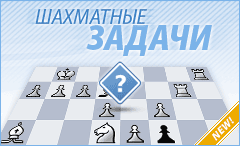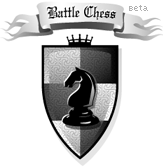Правила проведения шахматных турниров |
Круговые турниры
Принцип таких турниров прост: каждый играет с каждым. Например, если в турнире играют 5 человек, то каждый должен будет сыграть 4 партии — по одной со всеми участниками турнира. Т.е. всего в этом турнире будет сыграно 10 партий. За каждую победу начисляется 1 очко, за ничью — 0,5 очка, за проигрыш 0 очков.
В круговых турнирах может играть любое количество человек. При проведении турнира по классическим шахматам распределение цветов между участниками (жеребьёвка) производится автоматически случайным образом. При проведении турнира по боевым шахматам цвет фигур игрока, и, соответственно, право первого хода определяются непосредственно перед началом игры компьютером.
Любой игрок может записаться в один или несколько турниров (игроки, использующие компьютерные шахматные программы, не могут принимать участия в турнирах).
Для боевых шахмат время на расстановку фигур ограничено согласно КВ турнира. В случае, если оба игрока не завершили расстановку в назначенное время, игра автоматически заканчивается ничьей. Если фигуры расставлены лишь одним из игроков, ему автоматически присуждается победа. В следующий тур не могут выходить игроки, не сыгравшие ни одной партии.
Турнирная таблица обновляется в режиме реального времени. Как только завершается турнирная партия, ее результаты автоматически вносятся таблицу, вычисляются очки игроков и дополнительные коэффициенты. Победа, ничья и поражение дают игроку соответственно 1, 0,5 и 0 очков. Места распределяются следующим образом:
- чем больше очков, тем выше место;
- при равенстве очков: чем больше SB, тем выше место;
- при равенстве очков и SB место определяется по среднему рейтингу всех оппонентов, с которыми встречался игрок в ходе турнира.
SB — это коэффициент Соннеборна-Бергера. Вычисляется так: удвоенная сумма очков соперников, над которыми одержана победа, плюс сумма очков соперников, с которыми ничья. Этот коэффициент учитывает разный «вес» побед, оценивая победу над сильным соперником выше.
Турнир завершается вместе с окончанием последней партии турнира. В этот момент производится распределение мест.
Время на регистрацию в 1-й тур ограничено и указывается отдельно для каждого турнира. Оно может быть увеличено (для турниров без предварительной регистрации) в случае, если в последней турнирной таблице зарегистрировалось менее 60% участников от возможного количества (но не более чем на 1 неделю).
Время на регистрацию во 2-й и последующие туры ограничено, игрок может зарегистрироваться только в течение 2-х недель с момента начала соответствующего тура.
Турнир очередного класса или уровня проводится в случае, если в нем может участвовать не менее 11 игроков. Наличие 11 игроков в соответствующем уровне или классе дает им право ходатайствовать перед администрацией о проведении между ними турнира.
Систематические турниры
- Систематические турниры делятся на 5 видов:
- «Выходного дня» турнир проводится в субботу или воскресенье. Следующий турнир стартует соответственно в следующую субботу (или воскресенье) и т.д. Время запуска турнира указывается при старте 1-го турнира серии.
- «Рабочие дни» аналогичен турниру выходного дня за исключением того, что проводится с понедельника по пятницу.
- «Еженедельный» аналогичен ежедневному турниру за исключением того, что турнир запускается 1 раз в неделю в день недели, указанный при регистрации, например в среду или пятницу.
- «Ежемесячный» аналогичен еженедельному за исключением того, что создается 1 раз в месяц, в день месяца, указанный при регистрации, например 1-го числа каждого месяца.
- «Обычный» каждый последующий турнир создается сразу же после окончания предыдущего.
- Предварительная регистрация в 1-й тур производится пользователями самостоятельно. До начала 1-го тура пользователь может отказаться от участия в турнире.
- Игры стартуют после завершения регистрации игроков. Если на участие в турнире зарегистрировалось менее 15 игроков, то начало первого тура переносится (например, для турнира «Рабочие дни» на следующий рабочий день, для турнира «Выходного дня» на следующий выходной день).
- Кол-во
групп и число игроков в группе рассчитывается автоматически и все игры создаются одновременно!
- После окончания каждого из туров публикуется новость и раздаются награды.
- В финал и суперфинал регистрация пользователей происходит автоматически.
- Каждый последующий тур стартует сразу после окончания предыдущего.
- Перед началом каждого тура участникам производится рассылка.
Плей-офф (playoff)
Плей-офф (playoff) — система проведения турниров, при которой проигравший выбывает из дальнейших соревнований.
Проведение турниров
- Необходимо количество участников, равное 2 в степени n, где n-предполагаемое число туров.
- Участники подают заявку на участие.
- Как только набрано необходимое количество участников регистрация заканчивается.
- Игры начинаются автоматически в заранее определенное время (Все участники выстраиваются в случайном порядке, Играет 1-й со 2-м, 3-й с 4-м и т.д.)
- Каждый следующий тур начинается после завершения всех партий текущего тура (Для суперблиц-турниров за 1 день проводится 1 тур).
- Каждая пара играет либо двойные партии, либо последовательные со сменой первого хода, либо всего одну партию.
- Выигрывает тот, кто набрал большее количество очков. В случае ничьей побеждает игрок с меньшим рейтингом.
- Во второй и последующие туры выходят только победители.
- Победителем турнира считается игрок, не проигравший ни одной игры.
Швейцарская система
Швейцарская система — система проведения турниров. Впервые была применена в Цюрихе в 1895 году. Использование данной системы позволяет выявить победителей за меньшее количество партий, чем при круговой системе.
Проведение турниров
- Количество игроков должно быть четным.
- Программа выстраивает игроков по рейтингу и делит на две группы. Если рейтинга нет, то деление происходит случайным образом.
- Первый из первой группы играет с первым из второй. Т.е. при 20-ти участниках 1-й играет с 11-м, 2-й с 12-м и т.д.
- Во втором туре программа делит игроков на три группы:
- выигравшие;
- с ничейным результатом;
- проигравшие.
Если в одной из групп образуется нечетное количество игроков, то последний игрок из предыдущей группы спускается в нижнюю группу и играет в паре с верхним участником из этой группы.
- Для проведения второго и последующих туров игроки каждой очковой группы определяются так же, как в п.1-п.3.
Особенности правил
- Игрок не может играть две и более партий с одним и тем же соперником.
- Цвета фигур в партиях должны чередоваться. Если у обоих игроков одинаковое количество партий, сыгранных каждым цветом, то белыми играет тот, кто последнюю партию играл черными. В любом случае, игрок не должен играть подряд более 3-х партий одним цветом. Правило не действует для боевых шахмат, где право первого хода всегда определяется жребием.
- Если соперник не явился на игру, то игрок получает очко как победитель.
- Количество туров такое же, как и при системе play-off для данного числа участников.
Подсчет очков
- Места распределяются по сумме набранных очков.
- Если у игроков одинаковое количество очков, то для определения победителя используют Коэффициент Бухгольца. Коэффициент Бухгольца игрока складывается из суммы всех очков соперников, с которыми данный участник играл, независимо от результата встреч между ними.
Правила организации очных турниров
Настоящие Правила являются концепцией в соответствии с которой, с учетом мнений игроков портала battle-chess в дальнейшем будут выработаны более подробные Правила.
- Право на организацию и проведение очных турниров имеет «Организатор». Организатором может быть:
- Администрация портала, далее «Администратор»
- Любой победитель любого очного турнира по Боевым шахматам, организованным порталом battle-chess, далее «Мастер».
Организаторов турнира может быть несколько человек, удовлетворяющих вышеперечисленным условиям. Организатор может пригласить в помощь себе помощников из числа пользователей портала battle-chess.
- Обязанности Организатора:
- Определить Регламент Турнира и согласовать его с администрацией портала (в случае, если Организатором является Мастер).
- Найти источник финансирования турнира (спонсор, собственные средства, сборы от участников турнира и пр.). Условия освещения участия спонсора определяется отдельно соглашением между спонсором и Администрацией портала.
- Обеспечить место проведения Турнира
- Обеспечить явку на турнир не менее 10 человек из числа пользователей портала, имеющих игровой стаж в Боевые шахматы не менее 20 партий и участвовавших хотя бы в одном онлайн турнире по Боевым шахматам.
- Обеспечить игрокам честность в играх, исключив возможность использования ими помощи компьютерных программ и подсказок третьих лиц.
- Не принимать участие в Турнире, если кроме него в Турнире нет других Организаторов. В случае если Организаторов несколько, то отказаться от участия в Турнире должен только один из них.
Оплата труда Организатора за организацию турнира не предусмотрена, однако, если турнир организован как платный и после его окончания и всех выплат (на призовой фонд и расходы на проведение турнира и пр.) у Организатора остались средства — они остаются у него как оплата за проведение турнира.
- Обязанности администрации портала:
Обеспечить технологическую совместимость параметров турнира и его Регламента.
Обеспечить организатора грамотами победителей турнира.
Мастера портала Боевые шахматы, имеющие право проводить очные турниры:
- AXEL76 — Победитель очного турнира Боевые шахматы онлайн: РЕАЛ-Москва 2008
- Voice, Эд — Победители очного турнира Боевые шахматы онлайн: Реал-Питер 2008
- Малкавианин — Победитель очного турнира Боевые шахматы онлайн: РЕАЛ-Москва 2009
|

Зарегистрированных пользователей: | 41237 |
Активных пользователей: | 23 |
Пользователи онлайн: | 639 |
Команд: | 44 |
Сыграно боевых партий: | 162816 |
Сыграно классических партий: | 253097 |
Незавершенных боевых партий: | 0 |
Незавершенных классических партий: | 0 |
Боевых расстановок в базе: | 63919 |



|

